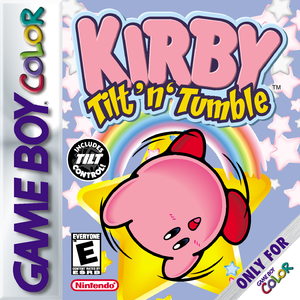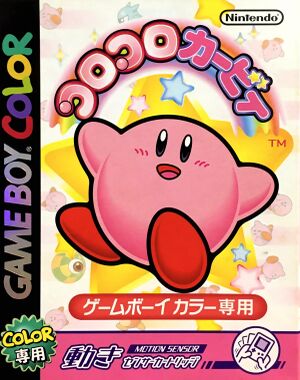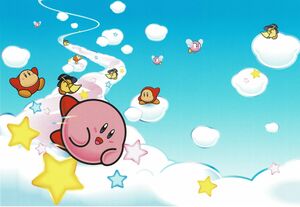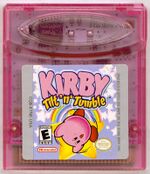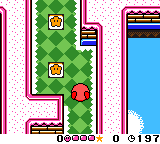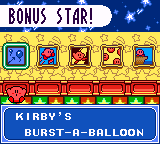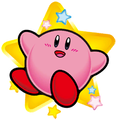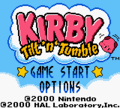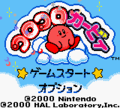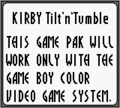Kirby Tilt 'n' Tumble
| ||||||||||||||||||||
| ||||||||||||||||||||
| ||||||||||||||||||||
|
| ||||||||||||||||||||
- This article is about the spin-off title for the Game Boy Color, and should not be confused with Tilt-and-Roll Kirby.
Kirby Tilt 'n' Tumble is a spin-off Kirby game released for the Game Boy Color, being the only game in the series to be released for that specific system. It was first released in 2000 in Japan and then the following year, 2001, in North America. The game was never released in Europe.
In Kirby Tilt 'n' Tumble, King Dedede is once again responsible for stealing Dream Land's Sparkling Stars, and Kirby is tasked with setting out and recovering them. Instead of running, hovering, or inhaling, however, Kirby traverses his world by rolling around like a marble in a top-down environment, where the biggest obstacles are bottomless pits and any enemy or object which threatens to bounce Kirby into one. Uniquely, Kirby Tilt 'n' Tumble uses a tilt sensor built into the game cartridge allowing the player to move Kirby around through physical movement of the Game Boy Color console, rather than using any of the face buttons. Additionally, the player can flick the console to make Kirby bounce into the air, which also has an effect on enemies and objects in the game.
The game was developed by Nintendo R&D2, Nintendo's primary hardware-developing division, which was later merged into Nintendo SPD. It was originally planned to have a direct follow-up for the Nintendo GameCube - titled Kirby Tilt 'n' Tumble 2 - which would have been controlled from a Game Boy Advance via the link cable. Kirby Tilt 'n' Tumble 2 was ultimately canceled for unknown reasons, however.
Story
| “ | Welcome to Pop Star. It's a very peaceful place. | ” | — Opening text from the intro cutscene of Kirby Tilt 'n' Tumble |
Kirby is sleeping on a cloud, when he is awoken by a Waddle Dee and King Dedede walking past him carrying strange objects. Kirby is curious as to their intentions, so he hops on a Warp Star, only to find that Dream Land has been robbed of its stars. Kirby sets out all across Pop Star to get the stars back from King Dedede, eventually defeating him in an unorthodox battle involving cannons.
Gameplay
In Kirby Tilt 'n' Tumble, Kirby does not move as he normally would in the main series, but instead rolls around like a marble. To control him, the player will need to tilt the Game Boy Color in the appropriate directions. As such, the stages are built like rolling marble courses in a top-down view similar to that of older The Legend of Zelda games, and Kirby can easily lose a life if he goes over an edge. The main challenge comes from getting Kirby safely over pits and obstacles. This can be aided by having the player flick the Game Boy Color upward to make Kirby bounce over open pits. Other methods of traversal include using items and stage devices like Bumpers, Jump Holes, and Balloons which grant temporary flight, among other objects. Enemies also appear on the stage, though Kirby cannot inhale them, and touching them will usually deal him some damage. Kirby will need to make use of temporary invulnerability or a special item - such as the Microphone - to defeat them. Against bosses, Kirby can fight back by using various methods, usually by launching into their weak points.
Each stage also has a time limit, which can be extended by collecting Stopwatches or passing checkpoint gates on the stage. When the timer drops below 50 seconds, an alarm sounds, along with a message saying "HURRY UP!!", and the music changes to a more fast-paced version. If the timer reaches zero before Kirby reaches the level's end, he loses a life.
There are also a couple of bonus stars which are optional to obtain. Depending on their color, these can have various effects: Warp Stars can take Kirby to bonus areas to get additional 1-Ups, Blue Stars allow Kirby to play a Sub-Game after completing the stage, and Red Stars contribute to unlocking the Extra Game and attaining 100% completion.
Levels & Stages
Kirby Tilt 'n' Tumble consists of eight levels, each containing four stages. It is possible to skip levels and stages by visiting Whispy Woods in certain areas. Each stage has a Red Star to collect, which are necessary to earn 100% completion.
| Levels in Kirby Tilt 'n' Tumble | |||
|---|---|---|---|
| Level Nr. | Stages | Boss(es) | Notes |
| Lvl 1-1 Lvl 1-2 Lvl 1-3 Lvl 1-4 |
Orbservor | The Orbservor at the end of this level is green, and moves fairly sluggishly compared to its later cousins. | |
| Lvl 2-1 Lvl 2-2 Lvl 2-3 Lvl 2-4 |
Orbservor | In the Main Game, the brown Orbservor is fought here, but the gray one is fought in the Extra Game. | |
| Lvl 3-1 Lvl 3-2 Lvl 3-3 Lvl 3-4 |
Kracko | Kracko uses his Co-Krackos to attack in his fight here. | |
| Lvl 4-1 Lvl 4-2 Lvl 4-3 Lvl 4-4 |
Orbservor | In the Main Game, the gray Orbservor is fought here, but the brown one is fought in the Extra Game. | |
| Lvl 5-1 Lvl 5-2 Lvl 5-3 Lvl 5-4 |
Orbservor | This Orbservor is blue and fought in an icy arena. | |
| Lvl 6-1 Lvl 6-2 Lvl 6-3 Lvl 6-4 |
Kracko | Kracko shoots lightning in his boss fight here, which deals twice as much damage as the Co-Krackos. | |
| Lvl 7-1 Lvl 7-2 Lvl 7-3 Lvl 7-4 |
Orbservor | The gray Orbservor is fought in this level. | |
| Lvl 8-1 Lvl 8-2 Lvl 8-3 Lvl 8-4 |
King Dedede | The icon of this level changes to a statue of Kirby when it is completed. | |
Once the game is cleared 100%, the Extra Stage opens up, which is a re-run of the regular stages with increased difficulty and less time.
Sub-Games
There are five Sub-Games in Kirby Tilt 'n' Tumble, which can be played if Kirby collects a Blue Star and then completes the stage. After beating the game, they can also be replayed freely by selecting the Bonus Star on the world map. On the "Bonus Star!" sub-game menu, the player can choose from any of the five sub-games:
- Kirby's Burst-A-Balloon - A sub-game where the player uses tilt controls to help Kirby aim and shoot arrows at incoming balloons.
- Kirby's Hurdle Race - A sub-game where Kirby races against King Dedede while jumping over hurdles to avoid slowing down.
- Do The Kirby - A sub-game where the player has to copy a sequence of arrows to make Kirby dance.
- Kirby's Roll-O-Rama - A sub-game where the player has to guide Kirby balls using tilt controls into holes, while avoiding Gordos around the course.
- Kirby's Chicken Race - A sub-game where Kirby has to race against a chicken using a wind-up car that must be charged by shaking the player's system.
Enemies
| Enemies in Kirby Tilt 'n' Tumble | ||
|---|---|---|
| Enemy | Description | Notes |
| A big floating Kabu that pounds the ground when Kirby approaches, shaking the stage and potentially throwing Kirby off-balance. It can be defeated by crashing into it while invincible. | ||
| A flying cycloptic bat creature that will pursue Kirby if it sees him. It can be defeated using the Microphone. | ||
| Slowly-moving robots that block Kirby's path until they get out of the way. Red and blue ones can be influenced by flipping or bumping them, but yellow ones only move in response to switches. | ||
| A mischievous ghost that can be seen drifting toward Kirby, flying around in circles with other Boolers, or can appear out of nowhere in certain locations. If Kirby is hit by one, the Booler will laugh and then vanish. | ||
| A flying foe who holds position or moves back and forth, and can trail items behind him. Defeating Bronto Burt also rewards a star piece. | ||
| Broom-wielding enemies who sweep the ground back and forth and hurt Kirby if he hits them. They can be turned into stars with a flip of the Game Boy Color. | ||
| A hapless and harmless mushroom-like creature that can pop in and out of the sand or water, or linger inside Jump Holes. | Unlike in other games, Cappy has no cap in this title. | |
| Shotzos with balloons attached to them that track Kirby and try to fire at him from the air. They can be defeated with three Air Bullets and drop Balloons when taken out. | ||
| Large red octopuses which emerge from bodies of water and shoot up to three small projectiles in a straight line at Kirby. They can be defeated using the Microphone. | ||
| A disembodied floating gauntlet that catches and throws Kirby around in bonus games. The gray ones can be guided by tilting the Game Boy Color. | Not really an enemy; more similar to Zebon or a Cannon. | |
| These spikeballs float in various areas and will harm Kirby on impact. They cannot be defeated. | ||
| A small stone idol who mainly sits in place, acting as a roadblock. It can be turned into a star with a flip of the Game Boy Color. | ||
| This big overalls-wearing walrus rides along the water on a surfboard, and will try to get away from Kirby when he sees him. If the two collide, Mr. Frosty will simply bump Kirby away rather than harming him. In Lvl 3-1, Mr. Frosty is carrying a Red Star with him. | ||
| Mischievous little clowns who ride back and forth on balls in halfpipe areas. They do not hurt Kirby on impact, but they move quickly and can bump him quite a lot. The red ones move more quickly than the blue ones. | ||
| A stationary invulnerable black cannon which tracks Kirby and tries to fire shots at him. | ||
| An invincible bug with giant mandibles that lurks in sand and will hurt Kirby if he touches it. | ||
| A white squid-like creature that pops out of the water in riverways. It can be defeated and turned into a star if Kirby rams it with the Raft, but will otherwise harm him and throw him off the raft. | ||
| This rare enemy can be seen soaring slowly through the sky in various places. He can be shot down using an Air Bullet. | ||
| An erratically-flying saucer who takes two Air Bullets to defeat. It can drop a Balloon when defeated. | ||
| "Bothersome" wandering creatures which will hurt Kirby on contact. They can be easily defeated by flicking the Game Boy Color system to make Kirby jump, causing these guys to be popped up as well, turning them into star pieces as they come back down. | ||
| A cycloptic creature similar in appearance to Waddle Dee that can attack by firing a beam whip from his eye. He can be defeated by flipping the Game Boy Color to turn him into a star piece. | ||
Bosses
| Bosses in Kirby Tilt 'n' Tumble | |||
|---|---|---|---|
| Boss | Level(s) | HP | Description |
| Level 1, Level 2, Level 4, Level 5, Level 7 | 3 | A big spherical enemy with a single eye on top that serves as its weak point. There are four different varieties of Orbservor - distinguished by color - which attack in different patterns. | |
| Level 3, Level 6 | 6 | A cycloptic cloud enemy who attacks by filling the arena with Gordos while shooting Co-Krackos and lightning at Kirby. He can be attacked using Air Bullets after picking up the Balloon. | |
| Level 8 | 10 | Kirby's arch-rival and the thief who stole Dream Land's stars. He attacks by swinging his hammer, throwing it like a boomerang, and trying to charge at Kirby. Kirby can attack him by blasting at him with a Cannon while his guard is down. | |
Backward compatibility
While Kirby Tilt 'n' Tumble is backward compatible with the Game Boy Advance, it cannot be played properly from a Game Boy Advance SP unit, where the game cartridge must be inserted from the bottom and facing backward. As a result, playing Kirby Tilt 'n' Tumble on a Game Boy Advance SP inverts the controls. However, a workaround for properly calibrating the controls is to insert Kirby Tilt 'n' Tumble onto a GameShark and then into the SP unit, therefore properly reorienting the cartridge.
Similarly, Kirby Tilt 'n' Tumble can also be played using the Game Boy Player peripheral of the Nintendo GameCube. The game is incredibly difficult to play this way, as it requires the player to pick up the GameCube console itself and tilt it during gameplay. Aside from its impracticality, doing so can also damage the console and the Game Boy Player start-up disc (although the start-up disc can be taken out once the game is booted up).
Staff
The following is a list of staff who have worked on Kirby Tilt 'n' Tumble:
| Staff of Kirby Tilt 'n' Tumble | |
|---|---|
| Position | Developer(s) |
| Producer | Masayuki Uemura Kazuhiko Taniguchi |
| Supervisor | Toshihiko Nakago |
| Director | Toshiaki Suzuki |
| Assistant Director | Hiroki Sakagami |
| Course Designer | Hioroki Sakagami Go Endo Masami Yone |
| Programmer | Shigehiro Kasamatsu Eiji Nishikawa Eiji Noto Kiyoshi Kouda Yukari Suzuki |
| Designer | Yasushi Matsubara Hideo Hatayama Kyoko Kimura |
| Sound | Takuya Maekawa Yuichi Ozaki Masami Yone |
| Hardware | Masayuki Okawa Iwao Masuyama Akio Ikeda Toshikazu Tomizawa Nobuo Matsumiya Yoshihi Inoue Motoki Fujita Hitoshi Hasunuma |
| Illustrators | Keiko Izawa Ross Hirai |
| Progress Manager | Akiya Sakamoto |
| Coordinators | Kamon Yoshimura Sakae Yamazaki |
| Special Thanks | Shigeru Miyamoto Takashi Tezuka Satoru Iwata Hiroaki Suga Masahiro Sakurai Isshin Shimizu Yoshinori Tsuchiyama Katsuhiro Yamauchi SDR All R&D2 staff Super Mario Club |
| Localization | Bill Trinen Michelle Powers |
| Localization Managment | Jeff Miller Leslie Swan |
| NOA Engineering Debug Staff | Raychole l'Anett Rob Crombie Kirk Buchanan Yoshinobu Mantani Scott Callahan |
| Special Thanks (North America) | Minoru Arakawa Mike Fukuda Gail Tilden |
| Executive Producer | Hiroshi Yamauchi |
| Nintendo | |
Trivia
- This game almost got rebranded as a Pokémon game in the west, due to the series' huge popularity at the time. However, in the end the change didn't come to light, and it retained the Kirby brand.[1][2]
- This is the last Kirby game to have 8-bit graphics. It is also the last Kirby game to use the original English logo, which was replaced by the one used in the anime starting with Kirby: Nightmare in Dream Land.
- Most of Kirby's voice clips in this game were taken directly from his Super Smash Bros. and Kirby 64: The Crystal Shards appearances, though heavily bit-crushed to fit on the Game Boy cartridge. Barring some minor uncredited instances, he would not be formally voiced again in a Kirby game until Kirby's Epic Yarn, released some 10 years later.
- The way levels and stages are structured in this game is strikingly similar to the layout of the original Super Mario Bros., with eight levels consisting of four stages each, each fourth stage being a castle setting with a boss at the end, and two hidden places where the player can skip levels, similar to two of the Warp Zones in Super Mario Bros.
- Kirby Tilt 'n' Tumble won the 2001 Nintendo Power Award for "Most Overlooked Game".
Gallery
Miscellaneous
Message that shows up when trying to play the game on an original Game Boy
Names in other languages
| Language | Name | Meaning |
|---|---|---|
| Japanese | コロコロカービィ Koro Koro Kābyi |
Roll Roll Kirby |
| Chinese | Kirby Tilt 'n' Tumble |
- |
| Dutch | Kirby Tilt 'n' Tumble | - |
| French | Kirby Tilt 'n' Tumble | - |
| German | Kirby Tilt 'n' Tumble | - |
| Italian | Kirby Tilt 'n' Tumble | - |
| Korean | Kirby Tilt 'n' Tumble |
- |
| Portuguese | Kirby Tilt 'n' Tumble | - |
| Spanish | Kirby Tilt 'n' Tumble | - |
References
- ↑ "Kirby Keeps His Tilt", IGN
- ↑ Nintendo World (official Brazilian Nintendo magazine), issue 30, page 9
External links
| |||||||||||||||||||||||
